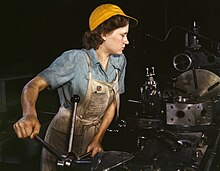This article needs additional citations for verification. (August 2022) |

Work or labor (labour in British English) is the intentional activity people perform to support the needs and desires of themselves, other people, or organizations.[1] In the context of economics, work can be viewed as the human activity that contributes (along with other factors of production) towards the goods and services within an economy.[2]
Work has existed in all human societies, either as paid or unpaid work, from gathering natural resources by hand in hunter-gatherer groups to operating complex technologies that substitute for physical or even mental effort within an agricultural, industrial, or post-industrial society. All but the simplest tasks in any work require specific skills, tools, and other resources, such as material for manufacturing goods. Humanity has developed a variety of institutions for group coordination of work, such as government programs, nonprofit organizations, cooperatives, and corporations.
Cultures and individuals across history have expressed a wide range of attitudes towards work. Besides objective differences, one culture may organize or attach social status to work roles through formalized professions which may carry specialized job titles and provide people with a career. Throughout history, work has been intimately connected with other aspects of society and politics, such as power, class, tradition, rights, and privileges. Accordingly, the division of labour is a prominent topic across the social sciences as both an abstract concept and a characteristic of individual cultures.[3] Work may also present a threat to individual human happiness and survival, either through dirty, dangerous, and demeaning occupations or in extreme cases, from death by overwork.
Some people have also engaged in critique of work and expressed a wish to reduce or abolish it entirely, for example in Paul Lafargue in his book The Right to Be Lazy,[4] David Graeber's Bullshit Jobs, or The Abolition of Work by Bob Black. Real world programs to eliminate the economic necessity for lifelong work first emerged through the concept of retirement, and have more recently been extended to all adults through experimentation with universal basic income.
- ^ Cite error: The named reference
Def1was invoked but never defined (see the help page). - ^ Cite error: The named reference
Def2was invoked but never defined (see the help page). - ^ Cite error: The named reference
DivOfLaborwas invoked but never defined (see the help page). - ^ "Work Definition". Oxford English Dictionary. Retrieved 23 November 2021.